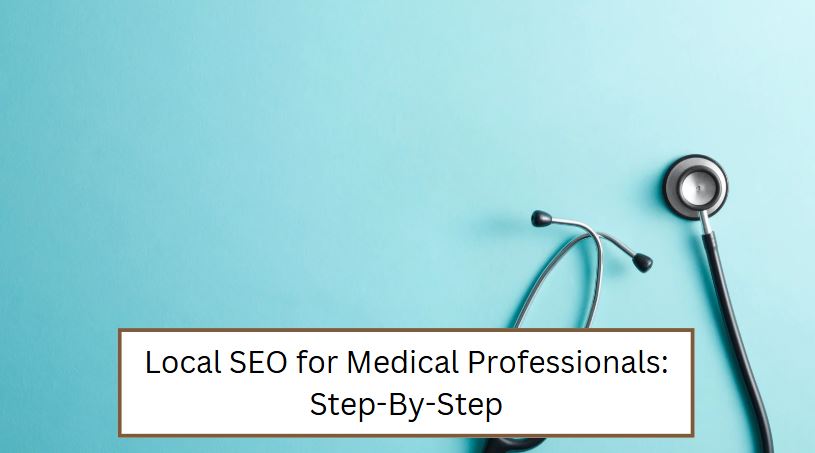If you’re a healthcare provider, your customers are searching for services like yours. Local SEO helps you appear in front of people when they search for keywords like “Best dentist near me” or “Best psychologist in [City name]”. But, how do you find the keywords people are typing into Google search? How do you make your business more visible than competing healthcare providers? In this guide, we’ll dive into local SEO for medical professionals. From making your site technically sound to building authority in the Industry through SEO, we’ve covered everything. Let’s dive in.
Why Local SEO for Medical Professionals?
Many patients use online searches to find hospitals and doctors for their health issues. In fact, 77% of people use search engines before they schedule a visit. By applying local SEO best practices to your business, you:
- Appear on Google Maps, allowing people to find your location and visit you easily
- Build trust with patient reviews
- Create a sustainable, organic source of high-quality traffic for your service
2 Important Aspects of Local SEO
To better understand how local SEO for medical professionals works, let’s break it into two parts:
Google Business Profile Optimization
Your Google Business Profile decides your visibility in Google Local Map Pack, Google Maps, and search results (More on this later). According to data, optimized GBPs can receive 80 and 300 clicks per month.
Website SEO
This is when you make your medical website more rank-worthy for relevant search queries. It involves optimizing your web pages for specific search queries and making your site technically sound. We’ll get into the details of it soon.
Related Read: Social Media Marketing for Doctors
Local SEO for Medical Professionals: Complete Strategy
Let’s dive into the practical step-by-step method to rank any medical service on Google.
Optimize Your Google Business Profile
If you don’t have an optimized Google Business Profile (GBP), you should start here. Make sure you have a verified Google Profile that has all your business information. This includes your business name, address, phone number, website URL, services, and more.
The more important thing, other than providing accurate business information, is keeping this information consistent. This means if your business has other citations on the internet, they should all match each other. Any inconsistencies can create confusion and impact your Google visibility negatively.
Your business images and reviews from customers are also important. Images help you stand out and build credibility by showing your physical location and team. Positive patient reviews tell future patients that they’ll be in safe hands. So, get as many of them as you can by asking your past and existing patients to give feedback.
Keep Your Website Mobile-Friendly and Fast
A website is your digital clinic. You have more control over how it looks and what information it shows. Keeping your site mobile-friendly is important because most people looking for local medical specialists use their phones for search. Over 60% of healthcare traffic comes from mobile devices. When your website is mobile-optimized, Google prioritizes it over those that aren’t.
The time it takes to load is also important, especially because people don’t have a long enough attention span. They expect to get the information they need without any delay. As a benchmark, make sure your website or landing page doesn’t take more than 3 seconds to load the most important information.
Website SEO has three parts:
Technical SEO: Helps search engines find, understand, and crawl your website effectively.
On-Page SEO: Makes your content more visible to search engines and users.
Off-Page SEO: Builds your authority and drives referral traffic.
Related Read: Advertising vs. Content Marketing
Implement Conversion Optimization Best Practices
Only the top 10% of websites have conversion rates above 11.45%. CRO should be a key part of your SEO strategy. It not only helps you convert more visitors but can also improve your rankings over time. This includes writing content for conversions, using visuals for engagement, and adding CTA buttons in all the right places to drive action.
Work on Attracting Backlinks to Your Site
According to data, top-ranking Google pages have 3.8x more backlinks than those lower down. Backlinks are links from external sources. They’re good for SEO because they act like votes of confidence from other website owners. However, instead of waiting for people to link to you, reach out to them and ask for a backlink. Offer something of value in exchange to make the deal business-friendly.
Manage Your Reputation and Leverage Reviews
Your reputation as a local service provider is crucial for long-term growth, especially because you’re a medical professional. Reputation management requires constant monitoring of what people are saying about your business online and addressing any negative feedback or comments. Because you want people to find you from local search, make sure your Google Business Profile reviews are addressed. Answer every review, positive or negative, politely and with professionalism.
Track and Optimize Your SEO
Without effective tracking in place, you won’t know if your local SEO efforts are paying off. On a broad level, track your ROI and see if you’re generating more revenue than you’re spending. Track your key performance indicators like GBP insights, website visits, conversion rate, etc, to identify weak spots and growth opportunities.
Read More: Loal SEO and Social Media (What’s the Relationship?)
Frequently Asked Questions
Let’s address some frequently asked questions about local SEO for medical professionals.
What are the Benefits of Local SEO for Medical Professionals?
Local SEO helps you attract high-intent search engine traffic to your business. It creates a sustainable source of patients for your services.
What is Local SEO for Doctors?
Local SEO for doctors is all about making your Google Business Profile and website more visible for search engines.
What is SEO in Healthcare?
SEO in healthcare includes GBP optimization, website SEO, citation & link-building, and reputation management.
Conclusion
Local search engine optimization is a crucial marketing strategy for every local service, including medical and healthcare. This is because when people search for doctors, hospitals, or healthcare centers, they’re in need of help. And you can be the one to offer that help with your skills and experience. Start by optimizing your GBP and building your authority in the space by networking with fellow medical professionals.
References:
- https://growtha.com/blog/healthcare-seo-statistics
- https://cubecreative.design/blog/small-business-marketing/google-business-profile-statistics-and-facts
- https://varnhealth.com/industry-insights/mobile-optimised-websites-in-healthcare/
- https://optinmonster.com/conversion-rate-optimization-statistics/
- https://seoprofy.com/blog/seo-statistics/




